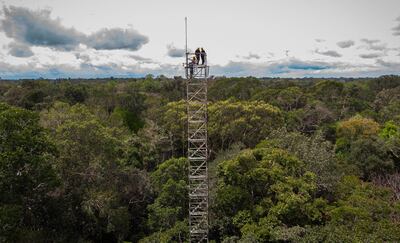Political carping at international efforts to head off the threat of climate change has broken out at the six-month mark before the UAE hosts Cop28 in November this year.
The overblown politicians saddling up their war horses could have usefully spent some time at the City of London’s summit for finance in climate change, as I did last week. In the glittering Egyptian Hall of Mansion House, a largely unseen shift in money circles to deliver net zero was being thrashed out.
The heavy lifting of changing behaviours and financial rules was on full display, and there was great enthusiasm for breakthrough outcomes from Cop28. The politicians could also usefully take some cues from the innovation in the real world that was also on display at a separate net-zero conference in another part of London, where 10,000 people were expected to attend the event showcasing climate innovation.
Or, indeed, the politicians could take their cues from Doconomy, a Swedish company that has developed a calculator that assesses all digital finance transactions for emissions. It does this by allowing firms to embed trackers inside apps that return an estimated carbon footprint from all users. This data can be authenticated and exploited to drive investment.
Doconomy’s Carbon Calculator is just one of a plethora of tools that can make a real-world difference. It is an irony that when businesses try to make a contribution, they find themselves under fire from both the right and left.

The left have stirred up a fake row that the UAE presidency is perpetuating fossil fuels over prioritising the 1.5°C ceiling for global warming. The right’s spoilers are attacking financial firms and threatening top insurers with loss of business and anti-trust lawsuits. A handful of insurers have quit the industry's Net-Zero Insurance Alliance (NZIA). Afterwards the umbrella grouping Glasgow Financial Alliance for Net Zero – better known as Gfanz – warned through its boss, Mark Carney, of the damage such political interventions wreak.
"These political attacks are now interfering with insurers’ independent efforts to price climate risk, which will harm policyholders, main street investors and local economies," a spokesperson for the UN-backed coalition of financial institutions said in a statement.
Most bosses are determined to press on. They are doing so because the future of their business depends on. Nicholas Lyons, the Lord Mayor of London, told me how much he admired the UAE team’s fresh approach to dialogue with vulnerable countries for funding. He hopes the UAE will host the “finance Cop”.
Not only is the time past for the West to tell the developed world what it must do, but he also says the pledges of the previous UN conferences must be replaced with mechanisms for delivery. “I don’t think we’ll be pointing fingers at people who aren’t accomplishing things, but I think we’ll be saying we have to measure progress and have much more focus on how to measure delivery,” he said. “You have to start with pledges and then demonstrate you’ve got practical plans and then you have to start delivering.”
Expect much more emphasis on initiatives such as the African Development Bank’s Climate Action Window, a new mechanism to channel climate finance for vulnerable countries to adapt to threats. Alongside this, there is the rolling out of the Climate Finance Accelerator, a British initiative overseen by accountants PwC to fund climate project developers. It offers funds across nine countries.
These are examples of what’s called “blended capital” that can provide all-important infrastructure finance that is needed not only for mitigation of climate change but adaptation to it. As the Cop28 team says, the world needs to adjust to warmer temperatures.

The blended capital approach provides a project-financing model for states or multilateral lenders to share the investment risk. This means more private-sector investment is attracted to boost the overall spend. When analysis suggests that less than $30 billion a year is invested worldwide by the private sector in nature-based solutions to climate change, there is clearly a need for more incentives to pull in public money.
The main money managers have a role to play, too. The large manager Phoenix Group is one of the big players to issue net-zero transition plans. It wants to make these mandatory for all large businesses it invests in. Launching its commitments at the London event, it said, would deliver a 50 per cent reduction in the carbon rating of £250 billion ($309 billion) worth of assets it controls by 2030. It also wants to be a net-zero business by 2050.
A report from Mastercard earlier this year predicted that its global customer base would be increasingly motivated by net zero over time. It is asking its card clients to demonstrate that they can align their products with locally sourced or ethically run precepts, so that customers feel the product matches their values. Its Priceless Planet Coalition to fight climate change is powered by the Doconomy technology mentioned above.
The small US lender Bangor Savings Bank is going a step further and using its rewards programme, Buoy Local, to give customers a framework for green consumption. Mastercard’s Jim Colvine spoke in London about how climate-focused loyalty programmes are a logical next step to drive green choices.
Real-world actions are pushing the agenda for lowering emissions and adapting to the climate threat. The politicians may not realise it yet, but Cop28 is positioning itself to capture that sweet spot to power an inclusive transition. It’s an empowering opportunity waiting to happen.


